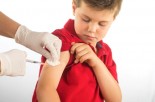The use of vaccines has led to major improvements in child health over a relatively short period.
Many of the infectious illnesses you or your parents had as children, from chickenpox to polio to measles, no longer affect most children today.
If you follow the immunization guidelines recommended by the American Academy of Pediatrics, you can help ensure your child is healthier than was ever possible in earlier generations.
Dr. Carrie Byington and Melanie Cole, MS, discuss just how important these vaccines are.
School Starts Soon: Are Your Children Vaccinated?

Featuring:
 Dr. Byington is the H.A. and Edna Benning Presidential Professor of Pediatrics at the University of Utah. She serves as the Associate Vice President for Faculty and Academic Affairs for the Utah Health Sciences Center, which includes the Schools of Medicine and Dentistry, the Colleges of Health, Nursing, and Pharmacy, and the Eccles Health Sciences Library. She is one of two PIs for the Utah Center for Clinical and Translational Science (CCTS). She is a physician scientist with a national reputation in pediatric infectious diseases. She was the 2011 recipient of the Gary C. Schoenwolf Mentorship Award and of the 2012 Linda K. Amos Award. She leads the research career development programs for the Utah CTSA and the Health Sciences Center.
Dr. Byington is the H.A. and Edna Benning Presidential Professor of Pediatrics at the University of Utah. She serves as the Associate Vice President for Faculty and Academic Affairs for the Utah Health Sciences Center, which includes the Schools of Medicine and Dentistry, the Colleges of Health, Nursing, and Pharmacy, and the Eccles Health Sciences Library. She is one of two PIs for the Utah Center for Clinical and Translational Science (CCTS). She is a physician scientist with a national reputation in pediatric infectious diseases. She was the 2011 recipient of the Gary C. Schoenwolf Mentorship Award and of the 2012 Linda K. Amos Award. She leads the research career development programs for the Utah CTSA and the Health Sciences Center.
Dr. Byington’s research has focused on viral and bacterial infections in infants and children. Research has included the development of new diagnostics, the clinical validation of diagnostics, epidemiology of infectious diseases using molecular diagnostics, and improving health services, including public health, through accurate diagnostics and informatics. The primary pathogens she has studied include enteroviruses, respiratory viruses particularly influenza and bacterial pathogens including Streptococcus pneumoniae and Neisseria meningitidis. She has several active NIH and CDC grants that support her work.
Carrie Byington, MD
 Dr. Byington is the H.A. and Edna Benning Presidential Professor of Pediatrics at the University of Utah. She serves as the Associate Vice President for Faculty and Academic Affairs for the Utah Health Sciences Center, which includes the Schools of Medicine and Dentistry, the Colleges of Health, Nursing, and Pharmacy, and the Eccles Health Sciences Library. She is one of two PIs for the Utah Center for Clinical and Translational Science (CCTS). She is a physician scientist with a national reputation in pediatric infectious diseases. She was the 2011 recipient of the Gary C. Schoenwolf Mentorship Award and of the 2012 Linda K. Amos Award. She leads the research career development programs for the Utah CTSA and the Health Sciences Center.
Dr. Byington is the H.A. and Edna Benning Presidential Professor of Pediatrics at the University of Utah. She serves as the Associate Vice President for Faculty and Academic Affairs for the Utah Health Sciences Center, which includes the Schools of Medicine and Dentistry, the Colleges of Health, Nursing, and Pharmacy, and the Eccles Health Sciences Library. She is one of two PIs for the Utah Center for Clinical and Translational Science (CCTS). She is a physician scientist with a national reputation in pediatric infectious diseases. She was the 2011 recipient of the Gary C. Schoenwolf Mentorship Award and of the 2012 Linda K. Amos Award. She leads the research career development programs for the Utah CTSA and the Health Sciences Center. Dr. Byington’s research has focused on viral and bacterial infections in infants and children. Research has included the development of new diagnostics, the clinical validation of diagnostics, epidemiology of infectious diseases using molecular diagnostics, and improving health services, including public health, through accurate diagnostics and informatics. The primary pathogens she has studied include enteroviruses, respiratory viruses particularly influenza and bacterial pathogens including Streptococcus pneumoniae and Neisseria meningitidis. She has several active NIH and CDC grants that support her work.
Transcription: